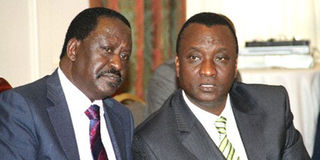Judge recalls how State harassed him over 1990 Saba Saba rally

Prime Minister Raila Odinga (left) confers with Member of Parliament Gitobu Imanyara (right) at the Saba Saba Anniversary "Repositioning the Reform Agenda" hosted by the Muslims for Human Rights (MUHURI) at the Hilton Hotel on July 4, 2012. Photo/DIANA NGILA
What you need to know:
- Remembrance of days when political activism was said to cause despondency and fear
Thursday July 5, 1990 was one of the darkest days in the life of Mohammed Khadhar Ibrahim.
That day the young lawyer, now a judge of the Supreme Court, was detained in the run-up to the aborted July 7, 1990 pro-democracy rally, now known as Saba Saba, at Nairobi’s Kaumukunji grounds.
“You have been involved in subversive activities aimed at undermining and overthrowing the government of Kenya as per law established,” said the detention order signed by Jackson Harvester Angaine, then powerful the minister of State in the Office of the President.
“You have associated yourself and established frequent contacts with known anti-government characters and personalities such like Kenneth Matiba and Charles Rubia.”
According to the order, the detainee had conducted himself in total disregard and disrespect of the Head of State and engaged in activities aimed at creating despondency and fear among the people and inhabitants of Kenya.
Detained for legal advice
Mr Matiba and Mr Rubia had been arrested the same week and detained for organising the Saba Saba rally. Others detained were lawyers Gitobu Imanyara, John Khaminwa and politicians Raila Odinga and George Moseti Anyona.
In a rare interview with Sunday Nation, Mr Justice Ibrahim said it was unreasonable for the Nyayo regime to detain lawyers for offering legal services.
“We were detained for giving legal advice and supporting pro-democracy champions. We didn’t intend to overthrow the government. We were pushing for political and social change using peaceful means,” he says. “It was the most traumatising and depressing experience of my life.”
He was arrested by the Special Branch at 5 pm at the Electricity House offices of Waruhiu & Muite Company Advocates where he was a junior partner on July 5, 1990, two days before the Kamukunji meeting to champion the restoration of multiparty democracy.
The officers were looking for Mr Paul Muite, then Law Society of Kenya chairman and senior partner, but they did not find him.
Mr Ibrahim was detained at Nairobi area police station and at exactly 2.35 am served with a detention order signed by Mr Angaine before being transferred to Kamiti prison.
Another senior lawyer, Dr Gibson Kamau Kuria, had taken refuge in the American Embassy and was later sneaked out of the country by then US ambassador Smith Hempstone while Kiraitu Murungi got wind of the arrests while in Ethiopia and fled to the United Kingdom.
Mr Ibrahim was held in a solitary cell at the maximum security prison for a month before he was released, but Mr Imanyara was re-arrested and detained for two years.
“Mr Matiba, Mr Odinga and Mr Imanyara were detained for long,” the judge recounted. “The condition of the detention was designed to de-humanise its victims.
“We were not allowed contact with the outside world. We survived on porridge without sugar. No blanket to cover ourselves. Not toilet. No newspaper,” he summed up.
But the experience would later shape his philosophy.
“It made me to appreciate the meaning of liberty, and it inspired me to support the liberation movement and a just society,” he says.
“I am proud of the tiny contribution I made in the campaign to protect our liberties and democracy. I am happy to be part of the reformed Judiciary, and I advise Kenyans to abide by the law and defend and protect their Constitution.”
Incidentally, Mr Justice Ibrahim now serves under Chief Justice Willy Mutunga, also a former detainee. He says working with Dr Mutunga is like a “miracle and great coincidence”.
On Saturday, Prime Minister Odinga led a rally in Nakuru to celebrate the efforts of the Saba Saba heroes. Dozens of people were killed and property destroyed following the riots triggered by the aborted rally.
President Mwai Kibaki, then Health minister, condemned the organisers and the rioters.
“This violence is being spread by people who are not genuinely seeking change. People who want change will use constitutional means; they will use the existing machinery, right from the local authorities to Parliament,” he said.




